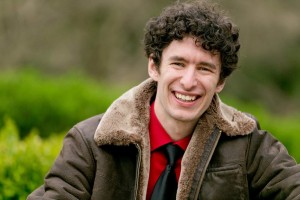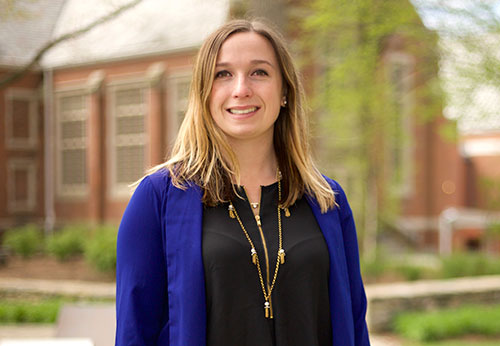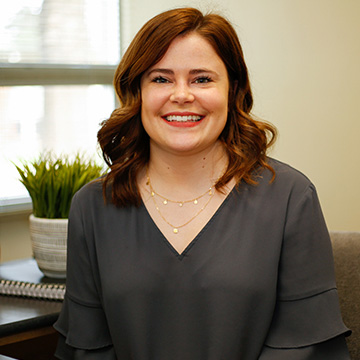"A Master's in Education is great, but it has little to do with working with students with disabilities. Having the certificate from UConn will definitely help further my career. I'm already feeling the positive effects and am now getting interviews. Even though I only work part-time, I feel ready to show a prospective employer that I'm ready for full-time." — Adam Kosakowski - Postsecondary Disability Services Online Graduate Certificate, Fall 2016

Landing Interviews
There's nothing more frustrating than applying for jobs in a university or college setting and getting little response—especially when you have a Master's in Education. Thankfully, the tide is turning for Adam Kosakowski.
A graduate of Westfield State University in Massachusetts, where he received both his undergraduate and graduate degrees, Adam quickly realized that teaching college math just "didn't feel quite right to me." As he says, "I really like the college-aged population of students, but I've realized I don't want to be a traditional math teacher."
Over the past year, Adam has worked part-time as an Assistive Technology Specialist at Western Connecticut State University. As he's discovered, helping students with special needs is right up his alley. So when his employer—a UConn alum—asked if he was looking for a career serving college students with disabilities, he said, "Absolutely, yes. That's when she told me about the UConn online certificate program and I immediately applied."
The more you put in, the more you get out
It didn't take long for Adam to figure out that just like any college class, the more effort you put in, the more you get out of the program. "I've found that the harder I've worked, the more confidence I've gained. Now I feel like I can talk intelligently with a prospective employer. I can give them actual examples that demonstrate how I've applied what I've learned in the program to my current job."
So was it hard to get accustomed to being an online student? Adam is a math whiz—and he's familiar with all kinds of technology, so taking online courses is a natural for him. But he says, "It's easy to get up to speed quickly. It's basically an interactive website that works like a forum. You can start a thread, and your fellow students can comment on it. If you know how to use email and social media sites, you'll find this very intuitive and easy to use."
Engaged instructors, engaged students
Plus Adam knows he can turn to his professors for whatever help he needs. As he notes, "Professor Lombardi has been incredibly supportive. I tend to work fast and get assignments done quickly. Even if I send in an assignment before the due date, she gets right back to me. She really cares about the course and pours herself into her job, and that helps me be more engaged."
Adam also points out that the online environment offers advantages that a traditional class setting doesn't. As someone who understands the benefits of assistive technology, he greatly appreciates that the PowerPoint presentations play like videos and include closed captions. "I'm not hard of hearing, but I really like to read along as the video is playing. It helps enhance my comprehension of the material," he says.
"Learning about what other professionals do in their school districts helps me think more creatively about what I can do now and in the future for students with disabilities. I think that anyone in a related field could easily apply the learnings from the certificate program to their jobs." — Lindsay Morales, Postsecondary Disability Services Online Graduate Certificate, Spring 2017
Lindsay Morales intends to combine her online graduate certificate
with her Master's in School Psychology degree—both from
UConn—to help high school students with disabilities successfully
transition into the next phase of their lives.
The Perfect Marriage
Lindsay Morales, a recent Master’s degree recipient in Educational Psychology, who is currently enrolled in UConn’s NEAG School of Education as a 6th year candidate in the School Psychology concentration, will be earning her specialist credential in School Psychology in the spring of 2018. She had no intention of taking the Postsecondary Disability Services Online Graduate Certificate Program at UConn—until she started working with students at the University's Center for Students with Disabilities. She views the addition of the certificate to her Master's degree credentials as the perfect marriage of two specialties, eventually enabling her to help high school students with disabilities transition into whatever life may bring after graduation.
To say Lindsay Morales is busy is an understatement. In addition to her graduate school courses, Lindsay juggles multiple jobs—graduate assistant at UConn's Center for Students with Disabilities; research assistant to Dr. Allison Lombardi; an academic mentor for UConn's Student Athlete Success Program; and Clinical Assessment Examiner for Natchaug Hospital in Hartford, CT. Adding the certificate program on top of all this was no easy feat. But as Lindsay notes, she is learning how to bring effective transition services to the high school environment to affect positive outcomes. "The online certificate program is really preparing me to do awesome transition work as a school psychologist for high school students. It's been an amazing experience."
In fact, Lindsay sees the addition of the certificate to her Master's credentials as the perfect marriage between her training as a K-12 school psychologist and her interest in students with disabilities. She wasn't planning on enrolling in the certificate program, but when she began her job at the Center for Students with Disabilities three years ago, she realized how much she loves working with college students. And she works with a lot of kids!
Surprisingly, about 4,000 students from UConn look to the Center for assistance each year. This includes kids with ADHD, depression, anxiety, chronic physical disabilities – and some students with short-term issues adjusting to college life, among other challenges. As Lindsay notes, "If a high school student were having problems, like if their grades were slipping, the school psychologist would proactively reach out to that person. But in college, no one is going to chase you down if you're having a bad day—or if you lack basic self-advocacy skills and aren't getting to class. Fortunately, our Center has a great outreach and marketing program, so we are quite well-known on the UConn Storrs campus and students in need can seek our support as required."
A wealth of perspectives
So what does Lindsay most appreciate about the certificate program? By far, it's the ability to connect with a diverse blend of professionals, from school psychologists to special education teachers. She also greatly values the exposure she has to guest lecturers, who bring their unique perspectives from other colleges and universities into the program.
"It's so interesting to hear everyone's thoughts on laws in their states or institutions," says Lindsay. "How students go about accessing services can look very different from one institution to the next, or from one state to the next. Learning about what other professionals do in their school districts helps me think more creatively about what I can do now and in the future for students with disabilities. I think that anyone in a related field could easily apply the learnings from the certificate program to their jobs."
Lively online discussions
In addition, the HuskyCT/Blackboard online platform has far exceeded Lindsay's expectations. As she explains, for each weekly module, instructors post questions to which students are required to post at least one original answer. "I make my original post, then wait to see who comments. Then I engage with them in discussions, which can get quite lively. Certainly you can do the minimum to get by. But you wouldn't be accessing the rich information, articles, practice briefs, and other materials provided by the instructors. Like any course, you get out of the program as much as you put in."
Getting a jump start on the future
As Lindsay has discovered, developing connections with other students and the instructors has provided a great opportunity for networking. "When anyone in our cohort hears about research, employment, or conference opportunities, we all let the instructors know and they announce it to the class. It's an excellent way to get a jump start on future opportunities." With her Master's degree from UConn, along with her certificate credential and diverse work experience, there's no doubt many doors will open for Lindsay to make a big difference in the lives of students with disabilities.
“I don’t think I could have gone anywhere else and received the level of knowledge that the Postsecondary Disability Services Online Graduate Certificate program provided. The professors at the University of Connecticut know what they are talking about; after all, UConn is well set up to support students with disabilities. This is one of the best programs in the country for people like me who want to create a classroom environment that helps students with disabilities transition more successfully into college.” — Nichole Fussell, Graduate of the Postsecondary Disability Services Online Graduate Certificate Program, Summer 2019
After completing the certificate program, Nichole Fussell feels so much more prepared to support the educational needs of students with disabilities at Faulkner University in Montgomery, AL.
Getting Ahead of the Curve
Hired in August 2018 as the Director of the Center for Disability Services at Faulkner University in Montgomery, AL, Nichole Fussell was tasked with improving the University’s ability to ensure that all students with disabilities have equal access to the same educational opportunities as other students. A licensed master Social Worker, she had just left a position as a therapist at Crossbridge Behavioral Health. “My new position overseeing the coordination of services to students with disabilities was very different. So I was intrigued when the University’s former disability director recommended enrolling in the Postsecondary Disability Services Online Graduate Certificate program at the University of Connecticut (UConn),” says Nichole, who adds: “I had a strong interest in learning more about legislation and assistive technology as it relates to the students I’d be working with. So I asked the University if I could enroll as part of my training, and they immediately agreed!”
Nichole began the program just a few weeks after she started her new job—and it began to pay off right away. The first of the four courses she took, EPSY 5145 - Issues in Postsecondary Disability Services, offered, among other topics, the historical perspective concerning access in higher education. “One of the important learnings of this course was the difference it makes when students with disabilities receive assistance as they are transitioning into college. It helped me better understand their needs and what I could do to facilitate the transition process at Faulkner.”
A great introduction to Universal Design
During the first course, Nichole was also introduced to the concept of Universal Design for Instruction (UDI) and its principles to postsecondary education and disability services, gaining invaluable insights into how to implement UDI throughout Faulkner University. “As a smaller university, we didn’t have a Universal Design strategy in place. But we really wanted to get ahead of the curve before a new year of students started classes. As I proceeded through the Postsecondary Disability Services Online Graduate Certificate program, I learned so much about how to set up a classroom to accommodate all kinds of learners, creating an environment that works for everyone—with and without disabilities.”
Learning how to help students with visual impairments
Having come into the university environment from a therapist position, Nichole had never worked with anyone who was visually impaired. So for the Spring 2019 course, EPSY 5199 - Independent Study in Education, she decided to focus her research on evaluating assistive technology for this particular group of students. Her instructor, Tabitha Mancini, suggested that she interview students to find out how they navigate the classroom in order to determine the types of assistive technologies that would be most helpful. “One of the Faulkner students I interviewed had gone blind later in life due to a medical issue and her family did not push for her to learn Braille. During the program, I found out about ‘tactile drawing film,’ which was especially helpful for this particular student, especially in her math classes. Thanks to the knowledge I gained about all kinds of assistive technologies, we are now ordering a variety of equipment to support the diverse range of learning styles that students with disabilities often have.”
Off to Boston for UConn’s PTI conference
In June 2019, Nichole was able to attend the annual Postsecondary Disability Training Institute (PTI) conference, which this year was held in Boston. The conference, sponsored by UConn's Center on Postsecondary Education and Disability, Neag School of Education, is held in conjunction with the final course, EPSY 5092 - Practicum. As Nichole says, “The conference was fantastic. I learned a lot of tips and tricks on how to implement UDI, which I think will help us avoid issues we’ve had in the past. For example, when UDI is properly implemented in the classroom, we have the benefit of there being a wide range of visual and/or audio aids for the variety of different learners in the classroom. When students with disabilities have access to the proper tools and technologies, they may not need additional time to complete a task or take a test. They feel less overwhelmed and are often able to stay in the classroom with their classmates.”
Nichole says the program also taught her how to simplify the Faulkner University’s website, making it easier for students with disabilities to navigate. “With what I learned during the program and from the conference, I was able to work with our Information Technology team to make our website much more accessible for everyone.” She also greatly appreciated learning more about how the law is implemented in disability services and how to find legal information and resources online. “There were many resources I had no idea even existed until I went through the program,” she notes.
Huge knowledge gain
So does Nichole think the program will help further her career? Absolutely, she says. But as she explains, “Even though having the certificate is great for my resume, learning so much about how to help students with disabilities transition to college was the best part of the program. This was a huge knowledge gain for me.”
In conclusion, she says: “I don’t think I could have gone anywhere else and received the level of knowledge that the Postsecondary Disability Services Online Graduate Certificate program provided. The professors at the University of Connecticut know what they are talking about; after all, UConn is well set up to support students with disabilities. The professors were also very approachable and helpful, always answering my questions and guiding me through the program. This is one of the best programs in the country for people like me who want to create a classroom environment that helps students with disabilities transition more successfully into college.”

